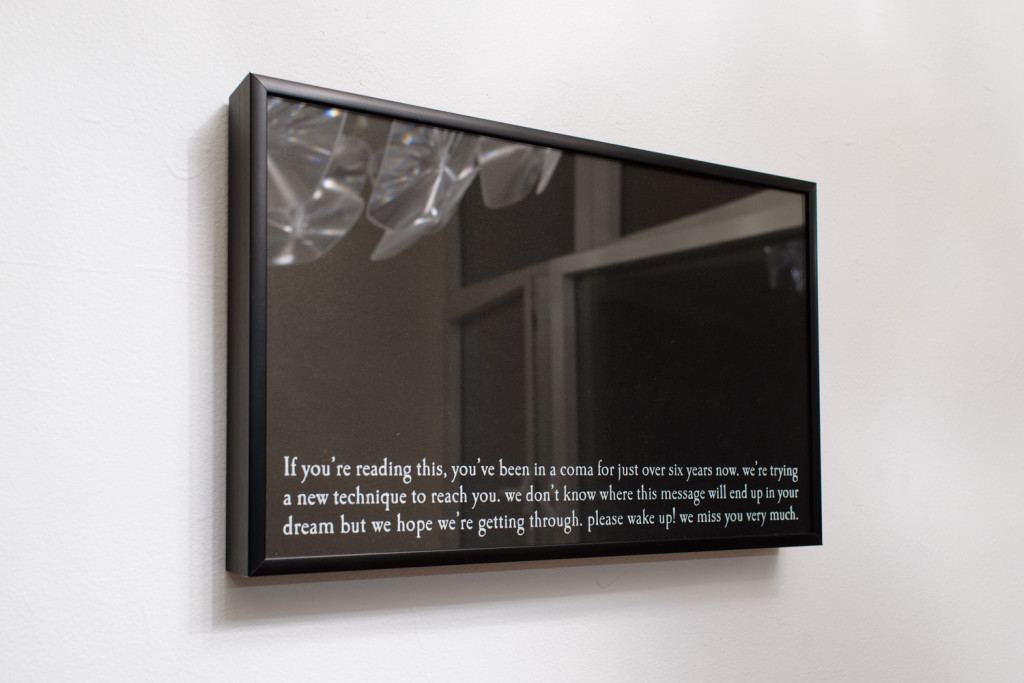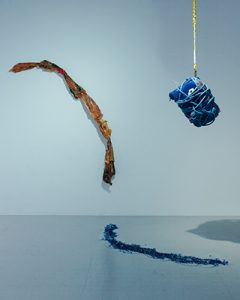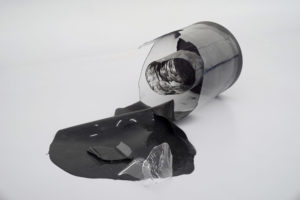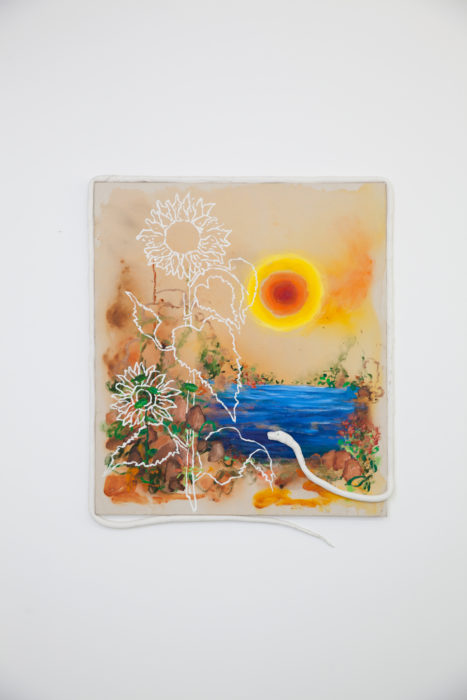
Hayden Dunham
The slow drip of social collapse + environmental decline in the Apocalypse Summer group show at ltd los angeles
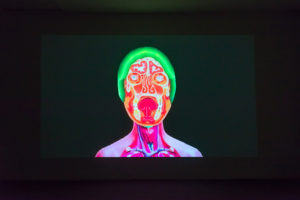

Spirituality and scepticism in As Above, So Below at Dublin’s IMMA, Apr 13 – Aug 27

The As Above, So Below: Portals, Visions, Spirits & Mystics major exhibition is on at Dublin’s IMMA (Irish Museum of Modern Art), opening April 13 and running to August 27.
Curated by Nottingham Contemporary’s Sam Thorne and IMMA’s Rachael Thomas, the project will begin in accordance with the Vedic astral chart with a ceremony and will carry on to be structured around four chapters: ‘Portals,’ ‘Below,’ ‘Above’ and ‘Beyond,’ each section accessing the theme from a different angle.
The program includes a large number of talks, events and performances that will take “a fresh look at the role of spirituality and transcendence in our global and sceptical present” and its relationship to visual art. The line-up features a selection of ‘modern masterworks,’ including Hilma af Klint, Steve McQueen and Bruce Nauman, as well as new commissions by Matt Copson, Eoghan Ryan, Hayden Dunham, Nora Berman and John Russell, among many others.
There will be a number of live music events that will soon be announced, including one organized by Linder Sterling and Maxwell Sterling on July 15.
See the IMMA website for the full programme and more details.**
share news item
Hypercapitalist East-Asia: how accelerationists make future-fuel

We know we can’t go back.
There was never an Eden —an ‘authentic’ pastoral past that, if we could just rediscover, would save us from our increasingly real alienation. This is why indie died. As Vampire Weekend frontman Ezra Koenig put it, “The world has spoken, and it prefers genuine fakes to fake genuines.”
The only way forward is through. Charlize Theron’s Furiosa character said as much in Mad Max, as she turned her post-apocalyptic convoy back from this promised land towards the centre of it all—the Citadel. The answer, as accelerationism tells us, lies not outside, but within and through capitalism. So now we have QT, Hayden Dunham’s PC Music alter-ego, telling us that she would “love to experience becoming vapor” while selling her own brand of energy drink.
But in our hurry to accelerate with rocket-speed our way toward a post-capitalist future, only some of us will be the astronauts piloting humanity through virtual dimensions of recombinant possibility. The rest will only become rocket fuel —data as energy, to feed the machine. What about those of us, most of us, who are getting thrown under the bus of technological progress, churned and mashed into pure desire?

I’m talking about accelerationism —that contemporary aesthetic and political strategy ominously channeling the destructive forces within capitalism —and its tendency to use the Other as its basis for movement. In our contemporary cultural imagination, post-colonial critic Edward Said’s Orientalism has taken new form: no longer just an amodern, innocent past, techno-Orientalism imagines East Asia as a hypercapitalist dystopian future.
This issue has been alluded to by writer and music critic Adam Harper before. In a piece on the ‘soothing sounds of East Asia’, he laments the way musicians and critics often refract only a tiny slice of the region, based some “some vague and often constructed sense of national character and national style”. What slices they choose reveals something about their views of contemporary Korea, China, Japan.
Take PC Music’s recent collaboration with Chinese singer Chris Lee (aka Li Yuchun), which produced the track ‘Real Love / Only You’. Lee is one of China’s biggest pop stars, whose career started from winning the country’s version of Idol, called Super Girls, in 2005. The music video is an archetype of identity critique in the internet age. In it, Lee wanders with confusion through a hall of mirrors in an astronaut-silver suit, blending into the environment as she searches for herself within it, while singing lyrics like “every time I see your face/in the mirror/this is how we spend our days” in an EDM-ful melodic crescendo. Trapped in a place that exists nowhere in particular, Lee is able to transform her anxiety into desire: “this is real love/this is real love/and it’s the way that I want to be,” she repeats.
This transmutation of anxiety about the future of technologically-mediated society into desire lies at the heart of accelerationist aesthetic currents. Many pieces have been published online dissecting how PC Music —in presenting an accelerationist sentiment and aesthetic in its artist roster —turns ‘-phobia’ into ‘-philia’. What I want to focus on here is the role played by East Asia in the process. To understand, we must begin historically, for our contemporary ‘bubblegum bass’ present traces a coupling of the Other with technology back to earlier aesthetic moments of vaporwave and cyberpunk.
The hip purveyors of PC Music’s sound might seem to have little in common with the anonymous nerds producing a music known as ‘vaporwave’, but without the conceptual ground laid by said micro-genre, the space would not exist for the London-born label’s brand of accelerationism. Vaporwave —that cluster of ironic internet neo-punks slowing down 80s smooth jazz then slapping roman busts on the end result —is one step back from PC Music. When we look at vaporwave album covers circa 2010 to 2012, certain elements in their aesthetic show up over and over again: signifiers of the late 80s and early 90s (beige desktops and dated computer graphics), hyperreal cityscapes (cyberpunk-looking skylines, virtual worlds, corporate advertising images), and East Asian artist and track names.
Let’s look at a specific example. 死夢VANITY’s album f a n t a s y 真夜中のアパート treats us to a diet of muted trumpets, syncopated piano solos, and sentimental saxophones —the sound of hazy jazz. Occasionally one or two tracks stir themselves up into a mischievous bossa nova, but the analog flickers and warm tones unmistakably construct a nostalgic mood, which seems to be declaring one thing: the party has just ended, and our best moments are behind us. The dream is dead, as the artist name similarly announces in Kanji/Chinese in the multimedia performance that is vaporwave names.
Like any smooth jazz that does its job properly, f a n t a s y 真夜中のアパート celebrates the little joys of department store life: the heft of quality cutlery; the sizzling sound of sparkling wine; the suppleness of black leather sofas. The tracks in the album deliver this in ample dose. But like any good vaporwave, the album never forgets to remind us, in the aporic moments between notes that have been purposely dragged out just a bit too long, that the possibility of these bourgeois joys it is letting us indulge in are fading with our dreams of a post-WWII prosperity that will never come back.
This aesthetic questioned the dominant stories that equate technology and interconnectivity with progress by reappropriating the utopian themes capitalism tried, and succeeded in selling to anyone growing up in the 90s. That default Windows XP background wallpaper of the rolling hills was Microsoft’s attempt to tell us, ‘Look, isn’t the technology-filled future open and full of sunshine?’
In these late capitalist times —when we have passed the point of no return for climate change, when inequality has returned to Gilded Age levels, when “automation and AI” threaten to turn today’s youth into a vast sea of precariat kept docile in an overly upbeat digital reality-show-cum-prison —what happened to the future we were supposed to inherit?
Flash back to the early 90s, to the beginnings of internet culture: Japan had climbed its way from WWII loser to Asian sub-empire and second biggest economy in the world. For the preceding two centuries, the island nation in the Pacific Ocean became the only East Asian imperial power because it alone had successfully modernised in the Meiji Revolution, following Western political and scientific ideologies. For a United States in the late 80s that was ambivalent about its identity and destiny in a world without the Soviet Union as Cold War arch-villain, paranoia began to set in. Directed towards East Asia, this paranoia saw Japan as a vassal poised to flip the tables on its master by studying and adopting the master’s capitalist ideology even more comprehensively than the master did.

Cyberpunk was how the West dealt with this anxiety. It was the panacea to America’s paranoid dreams of emasculation. What did cyberpunk as an aesthetic genre propose? It mapped the information-overloaded hypercapitalist future onto the East Asian cityscape, and invited readers to explore and conquer it as a frontier, just like in the “opening of Japan”, just like in the American West, with the protagonists as techno-cowboys hacking their way through the exotic jungle of vaporous bio-geopolitical information assemblage.
In the cyberpunk imagination, Japan became this dystopian ultra-materialist future dominated by faceless corporations, a future whose semiotic overload was represented by images of a modular and continuously reconfiguring urban-scape. Neon lights and Shibuya became visual stand-ins for the complexity of the capitalist machine.
Vaporwave mostly took the first part of this aesthetic logic from cyberpunk: the problem of techno-futurity. It mapped anxieties about techno-futurity onto East Asia, and supercharged them into its trademark uncanniness. The genre’s producers deterritorialized the blithely optimistic semiotic regime coupling technology and futurity by using East Asia as an exotic wedge between the two.
Sonically, when vaporwave producers chopped, screwed, and slowed down samples of corporate mall muzak and Kenny G-level cheesy smooth jazz, they injected artificiality back into the most commercial of sounds. Or more precisely, they supercharged and surfaced the artificiality in this music that had hitherto been covered up. In doing so, they provoked in listeners a psychic unease and ambivalence towards capitalism’s utopian themes from the 80s and 90s that since the early 2010s have been threatening to naturalize and invest themselves in the depths of our cultural memory without much hint of resistance.

Returning to 死夢VANITY’s f a n t a s y 真夜中のアパート, we find on the album’s cover a translucent image of a geisha-looking woman superimposed onto an equally hazy nightshot of two skyscrapers, their facades lit up with rows upon rows of yellow rectangular windows. It’s not only that the information-overloaded complexity of capitalism is mapped onto a cityscape made to look as programmable as contemporary music controllers, but also that the conduit to this metro-computational interface is the image of a geisha, that imaginary of Asian femininity whose essential inhumanity —due to her exoticism and submissiveness —has long been etched onto the Western cultural canon by Orientalist ‘classics’ like Puccini’s Madame Butterfly.
Let’s return to today: If vaporwave posed the problem of techno-futurity, then PC Music followed by offering an accelerationist answer. Vaporwave disavowed and made alien the relationship between technology and futurity, and PC Music responded by embracing this coupling. One made the hitherto-desired alien, and the other made the alien desirable; a lockstep deterritorialization-reterritorialization. While vaporwave has held East Asia steady as scarily futuristic and used this now-rigid Other to push us beyond the present, PC Music has done the same, if only to pull us towards this freaky future. Both, whether disavowing or embracing it, map the alien-future onto East Asia.
That Chris Lee was the first artist outside the label whom PC Music worked with is part of this pulling temporal movement. In this collaboration, label-founder and producer A.G. Cook uses one of the signature techno-Orientalist moves of the vaporwave scene: the use of East Asian languages to perform a sense of exotic futurity. ‘Real Love / Only You’ was released in two versions, one targeting a Chinese audience and another targeting an English-speaking one. In the Chinese version, no English words or phrases show up, but the English version contains entire sections sung in Mandarin. This reversal of the usual way (English words in non-English songs) foreign languages are used in music certainly points to Cook’s rule-bending sensibilities. But due the way East Asian languages —whether in text or spoken form —have been used in cyberpunk and vaporwave to signify techno-futurity, due to the fact that most of the target audience cannot actually understand Mandarin (thus giving parts of the song an aura of unknowability), Cook’s use of it risks re-inscribing Lee’s performance into this very discourse.
But the worst of it actually comes from writing on PC Music. As a meta-narrative, techno-Orientalism lives as a discursive flow in the artist-critic circuit. In this circuit, East Asia is refracted as a hypercapitalist future through the work of artists, and then reified as such through the words of critics.
A piece reporting on the collaboration between Lee and Cook’s crew in Dazed Digital this year highlighted only one quote. It was from PC Music’s Finn Mactaggart, a director of the ‘Real Love / Only You’ music video, who shared that a live performance of the single was scheduled, but cancelled, because, “it was deemed too risky —there weren’t enough safeguards in place to stop a potential crowd surge”.
By foregrounding the comment in a pull-quote the article asks readers to imagine the crowd at Lee’s event as an uncontrollable horde threatening to overwhelm the spectacle of the performance; a machinic Other lurking in the background of the future. This Other ‘surge[s]’, like a flow of electricity, like multiplicity, one not adequately contained by disciplinary measures of confinement and partition that have characterized modernity.
Another comment in the piece, this time by Cook himself, draws attention to the hyper-mediated experience of the collaboration: “Chris Lee comes from a reality TV world, and is extremely comfortable in front of the camera.” Typical of PC Music’s performed attitudes towards hyper-mediation, he then purports to embrace such a spectacular experience. Like William Gibson’s cyberpunk settings, Cook presents the world Lee inhabits as ‘overloaded’, but instead of it being with sci-fi villain cyberpunk corporations, it is overloaded with Ryan Trecartin-esque cybertwee reality TV culture. Why does A.G. Cook go to Beijing, of all places, to find it?
![Shima33, Amiga-Tech -- [新コンセプト #1]. Released via Dream Catalogue, March 26, 2014.](https://www.aqnb.com/wp-content/uploads/2016/05/Shima33-Amiga-------Tech-----------------------1.-Released-via-Dream-Catalogue-March-26-2014..jpg)
The way that A.G. Cook describes being in the studio with Lee makes him come across as student overwhelmed but impressed by the assemblage surrounding her. Her hyper-mediated situation is “the kind of overloaded, multi-cam, multi-perspective experience” that PC Music tried to recreate for their own Pop Cube live show in Brooklyn. Lee, in their view, was worth seeking out, because she can do what PC Music have been wanting to do.
In turn, Cook went to Beijing in search of the machinic master living in the land of hypermediation, the authentic Other who then demonstrated to him their ‘comfortable’ mastery of the perverse future of surveillance capitalism. In needing an authentic hypercapitalism to embrace in its logic of irony, PC Music set their sights on the Chinese capital, a place that has lately been accruing a reputation in the press as a stand-in for globalised environmental destruction.
Both these quotes, from Mactaggart and Cook, reduce and distill China, in all its culturally complex multiplicity, into a narrow trope, that of an alienating dystopian future. Both follow the internet aesthetic lineage from cyberpunk to vaporwave that holds East Asia steady in order to move temporally through the present.
Techno-Orientalist aesthetics produced in this way lack an ingredient crucial to today’s increasingly xenophobic world: an openness to genuine encounters with the Other. To accelerate towards the future with fuel made from the Other is not to accelerate towards a new life, but towards death itself.**
Wu Yuan (aka Brent Lin) is a researcher and writer based in Vancouver, Canada.
Header image: 2814, 新しい日の誕生 album art. Released via Dream Catalogue, January 21, 2015.
share news itemTrace Programme @ Aspirational Living, Feb 18 – 21

Trace Programme is a weekend with a group exhibition and a publication launch hosted by Aspirational Living at a yet-to-be disclosed location, between February 18 and 21.
Aspirational Living is a new nomadic curatorial project founded in Nottingham. Fittingly, perhaps, there seems to be loads of Trace Programme event pages all over facebook.
Curator for the Trace Programme, Ruth Angel Edwards has invited artists and collectives such as Joseph Buckley, Kate Cooper, Hayden Dunham (aka QT), School of the Damned, Emily Pope, Erica Scourti, Jake Kent, Dan Szor and Richard John Jones, who is also hosting an informal discussion on his research into lost lesbian, gay and queer spaces in an accompanying event TOTAL DESTROY on February 19.
A further accompanying event, a Rave Dinner Party, will be run by New York-based panhumanist collective, Communitas on the February 21.
A book will be launched on the opening evening including contributions from DeForrest Brown, Harry Burke, Rózsa Farkas, Lynn Hanna, Erica Scourti and Jamie Sterns.
See the FB event page for more information and a string of posts and links in anticipation**
